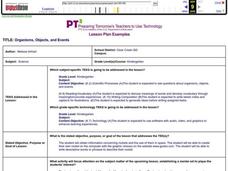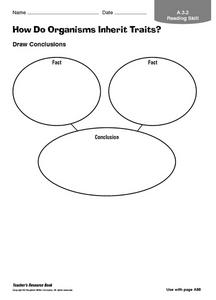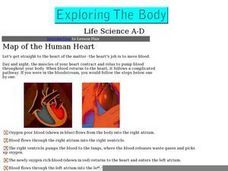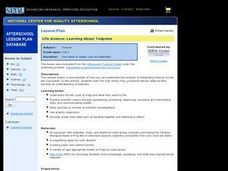Curated OER
Natural Selection
Biology learners tackle evolution-related concepts when viewing this collection of slides. There are no graphics or photos, just notes in bullet-point style detailing adaptations, evidence for evolution, mechanisms for change, and types...
Curated OER
Organisms, Objects, and Events
Students obtain information concerning rockets and the use of them in space. They create their own rocket on the computer with the graphic choices on the website www.goobo.com. They write descriptive phrases about their rocket.
Curated OER
Compare and Contrast
In this compare/contrast worksheet, students look at pictures of a chair and a cat and read about they are similar and different. Next, students fill in a graphic organizer about how these 2 things are alike and different.
Curated OER
Cause and Effect: Scientific Revolution
Graphic organizers are great! Help learners see and understand the causes and short and long-term effects of the Scientific Revolution. Great for visual learners.
Curated OER
Science Safari: Energy Resources
Students pick a topic that is related to energy and power companies, tools, and careers. They organize information, photos, illustrations, video, or other graphics into a presentation.
Curated OER
How Do Organisms Inherit Traits
In this traits worksheet, students will write down 2 facts about how traits are inherited and then come to a conclusion based on their facts. This worksheet is a graphic organizer.
Curated OER
Protection, Support, and Locomotion
In this skeletal system instructional activity, students will read a graphic organizer and complete 1 short answer question about the five functions of the skeleton. Then students will use a graphic organizer about muscle types to fill...
Curated OER
Cell Theory, Scientists, & Cell Types
In this cells worksheet, students compare the characteristics of eukaryotic and prokaryotic cells. Students describe how different scientists contributed to the cell theory. This worksheet has 6 short answer questions and 1 graphic...
Curated OER
Forces of Nature: If I Was A Hurricane
In this comprehension worksheet, students complete a graphic organizer and answer questions. Students pretend they are a hurricane, and use what they have learned to complete the questions.
Curated OER
Comparing Properties of Elements & Compounds
In this elements and compounds worksheet, learners review the physical properties of different compounds and elements using websites for information. This worksheet has 1 graphic organizer and 1 short answer question.
Curated OER
Phases of the Moon
For this phases of the moon worksheet, students first fill in and label a graphic organizer showing the moon's phases, then complete 5 fill in the blank sentences.
McGraw Hill
Arthropods
Are spiders related to crabs? Study the order of arthropods with a reading selection about animal diversity. It provides details about each class within the order, as well as vivid pictures and explanatory charts.
Curated OER
Environmental Issues Vocabulary and Speaking Exercise
Eight color graphics fill the top half of this page. Each of them is meant to represent a different environmental topic: poaching, deforestation, pollution, etc. Youngsters associate vocabulary terms with each graphic and then answer...
Curated OER
Map of the Human Heart
Click on this link and find two animated graphics of the pumping human heart. The path of blood-flow is listed in steps. The connection to the "teacher lesson plan information" does not work, but there are other links to superb resources...
Curated OER
Energy Transformation Worksheet
Upper elementary or middle school scientists determine what types of energy are involved in six different pictures. Then they produce examples of three different energy transformations. This learning exercise has colorful graphics and is...
Bantam Books
The Martian Chronicles: K-W-H-L Activity
Prepare your class for a unit on Ray Bradbury's The Martian Chronicles with an activity that works for pre-reading, during reading, and post-reading. Learners fill out a K-W-H-L chart to reflect on what they already know, what...
Code.org
Processing Arrays
Scholars use a playing card activity to help them develop a program to find the minimum value of a list. They learn to use for loops to write code that will process lists.
Code.org
Canvas and Arrays in Apps
Scholars learn how to make a digital canvas and fill it with artwork by creating a drawing app using the canvas element. The activity requires learners to previous knowledge of arrays and return commands to draw images.
PBS
NOVA Cybersecurity Lab Lesson Plan
Don't be fooled by cyber scams! An informative lesson teaches techies about cybersecurity. They watch videos, play a game, and engage in discussion to improve their understanding of online safety.
iCivics
Step One: We've Got Issues
What is the most pressing issue in your community? The resource helps you and your middle schoolers begin the process of doing something about it! Learners compare and contrast two pressing issues in their local counties by reading two...
PBS
Symbolism and the Use of “New Language” in The Handmaid’s Tale
Words matter. Words frame thought. Words are symbolic. Readers of Margaret Atwood's The Handmaid's Tale examine how the words In Gilead's "New Language" reinforce the power of the government and provided insight into the symbolic level...
Curated OER
Life Science- Learning About Tadpoles
Learners investigate a frog's life cycle. In this tadpole lesson, students observe tadpoles in an aquarium and record results. Learners fill in a KWL chart as an assessment.
Curated OER
Dissection Webquest
In this dissection webquest, students research information on the internet about dissections. Students compare the 4 websites to note differences in the definitions, explanations, and graphics presented of the term dissection. Students...
Curated OER
Re-Presenting Race in the Digital Age
Teen-aged scientists analyze a graphic organizer of how trash is removed from New York City and then answer standard questions about a graph and a diagram. Resources are mentioned, but there are no links to these resources, so you will...

























